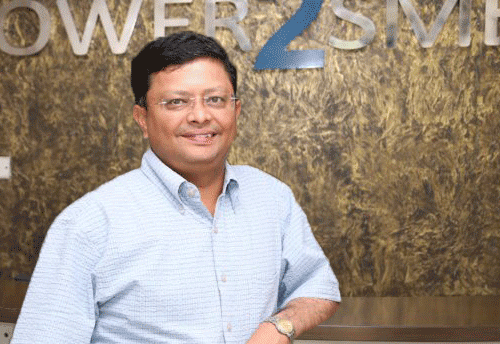Budget Spl - Need to address issues related to delayed payments and bounced cheques for MSMEs: Power2SME
Updated: Jan 25, 2017 11:22:37am

Budget Spl - Need to address issues related to delayed payments and bounced cheques for MSMEs: Power2SME
New Delhi, Jan 25 (KNN) The MSME segment is in dire need of level playing field, with not only great policies and campaigns but also with proper implementation of those policies, said R Narayan, Founder and CEO, Power2SME.
Ahead of the Union Budget, he suggested that government must consider two aspects with regards to policy development for SME sector: focus on reforms that not only encourage new businesses in the manufacturing sector but also affect the existing SME players that are wide spread in the country; and devise policies that help SMEs step up and ensure that the sector is able to participate as expected, in ambitious government initiatives such as GST Bill, Demonetization, Digital India, Make in India and others.
Narayan made recommendations on broadly three perspectives - Financial Inclusion; Digital Transformation; and Demonetization.
He said there is a dire need to address issues related to delayed payments and bounced cheque.
For this, Power2SME head recommended developing a portal to track delayed payments along with solutions.
“Some of the biggest enterprises in India collectively owe Rs. 10,000 crore to MSME against the supplies made by small units, as per a recent study by Knowledge and News Network – a venture between FISME and GIZ. If paid duly, this amount can make a huge impact of operations of MSMEs positively. However, the problem of delayed payments is contributing to adversely impact MSME functioning.” Narayan said.
He said in order to resolve this long standing financial problem of the entire MSME sector, there is need to establish the mechanism of E-platforms on which supply bills and receivables could be offered for discounting by MSMEs to banks and other financing institutions like NBFCs and factoring companies. These platforms should facilitate the Banks and financing institutions and other interested parties to offer their competitive discounting rates for the MSMEs and MSMEs should be able to opt for the best financing sources.
Further, MSMEs supplying to various corporate and other buyers should be able to get their bills realized on due dates as per agreed terms or within a maximum of 45 days.
In case of delay in realization, secure bill discounting takes place, Narayan said.
Post a corporate delays in making payment within 45 days, the bank/NBFC involved pays the MSME and the corporate in question must pay the bank with 14 per cent interest. The buyers should be strictly made to bear interest for such delays.
The mechanism of discounting of MSME bills through the e-platforms should be such which not only affords discounting of bills or receivables but also transfers the burden of interest payment for the period of delay beyond 45 days or the agreed period upon the buyers automatically.
He also suggested fast tracking legal actions on bounced cheques.
Under section 138 of The Negotiable Instruments Act 2002, a firm can file a case against customer if his/her cheque is dishonored by bank. However, given the long procedures followed and lengthy time taken to hear the case has cascading effect on SME players and its cashflow.
“We recommend that govt must establish strong laws against cheque bounce and also advice courts to put such cases on fast track to solve the issue within one month’s time span,” Power2SME CEO elaborated.
On Digital Transformation for SMEs, he said considering there is a dire need to improve business environment for MSMEs in India, we should look at aspects like making them globally competitive and need to transform them digitally and promote ease of doing business.
He said government must help MSMEs become globally competitive.
Availability of quality raw materials at reasonable price is a major concern of MSMEs. In order to make ‘Make in India’ mission successful the government must advice or mandate bulk raw material manufacturers in the country to allocate certain quantities of their products to be distributed to MSMEs. This distribution can be carried out through authorized channel partners who are engaged in such distribution and have experience in dealing with MSMEs in the country.
He sought support for MSMEs transform digitally through measures such as:
- MSMEs who are tech savvy and facilitate operational convenience to their customers such as cashless transactions, should be given weightage and special recognition in their performance rating
- MSME ministry must hold special GST workshops for SME players to understand various aspects of upcoming Goods and Service Tax Bill and what kind of technological tools/solutions are required to comply with GST
- Allocation of funds for exclusive purpose of technology up gradation among SME players, for SMEs to smoothly align with Industry 4.0 ( As per PwC research, Indian’s manufacturing units will have high level of digitisation in five years’, and Industry 4.0 concentrates on the end-to- end digitisation of all physical assets and their integration into digital ecosystems with value chain partners.)
- Build specialized co-working plug and play spaces with all necessary technological tools and solution for players to utilize for business activity purpose
- Set up special team within MSME Ministry to promote awareness on technology via workshops, events, etc.
Further he suggested government to improve ease of doing business; provide viable infrastructure; and Involve SMEs in the Smart City Project.
Narayan sought support for MSMEs to sail through Demonetization phase and also asked Government to address the issue of lack of Adequate and timely access to finance. (KNN Bureau)












